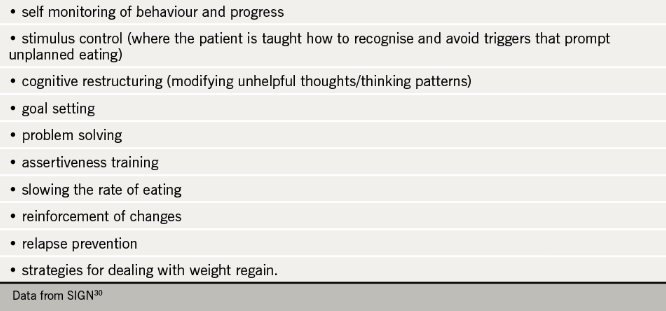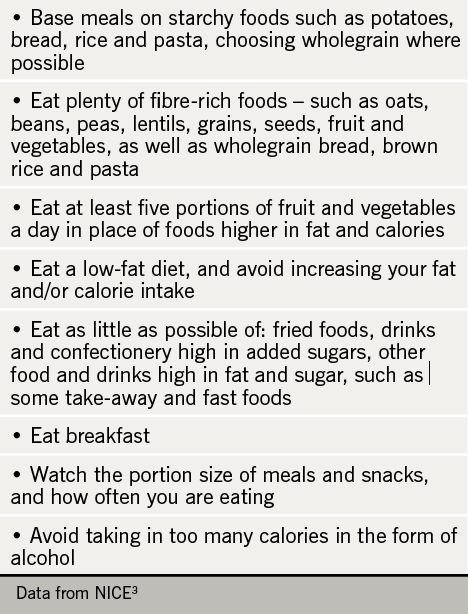Changing behaviour
It may take time to change the behaviour of an obese patient but clinicians can introduce basic concepts during the course of a normal consultation in the guise of sensible advice. Appropriate behavioural strategies will be needed to make and sustain new behaviours for life (see table 6).30 Lifestyle weight management programmes which encourage these strategies are covered in more detail below.

Physical activity
 A person’s current physical fitness and ability should always be taken into account. People should be encouraged to build up to recommended levels of exercise, using a managed approach with agreed goals.
A person’s current physical fitness and ability should always be taken into account. People should be encouraged to build up to recommended levels of exercise, using a managed approach with agreed goals.
NICE and SIGN recommend that daily sessions of moderate activity of 45–60 minutes will help prevent overweight and obesity, with higher daily targets of 60–90 minutes recommended to prevent weight regain.3,30 Moderate activity is any when breathing rate and body temperature is increased and conversation is comfortable. Many people may find these targets overwhelming and only 34% of the population currently self-report that they manage this much activity.31
It is therefore important to encourage patients to set small, achievable goals based on increasing their current activity levels. Individuals, particularly the sedentary, should be encouraged to reduce inactive periods, such as watching television or sitting at a computer. Explain that recommended daily activity levels can be taken in one session or several shorter ones lasting 10 minutes or more.
Emphasise that activity can be wide ranging and does not necessarily have to include going to the gym. Suggest activities that can be easily incorporated into everyday life and that patients aim to do something they enjoy, such as brisk walking, gardening or cycling. Other activities to recommend include swimming, walking a certain number of steps each day (using a pedometer can be helpful here), or stair climbing. For people who are less mobile other options need to be considered and offered. Recent research has shown that drumming, for example, can be recommended as a physical activity and it often engages people who are normally reluctant to exercise.32
 Vigorous intensity activity can also be incorporated into any physical activity programme gradually (after four to 12 weeks of moderate activity programme) but it is probably not appropriate for the very obese (BMI > 35 kg/m2)
Vigorous intensity activity can also be incorporated into any physical activity programme gradually (after four to 12 weeks of moderate activity programme) but it is probably not appropriate for the very obese (BMI > 35 kg/m2)
People should be aware of the significant health benefits associated with an active lifestyle which include improved control of type 2 diabetes, lipid profiles, blood pressure, insulin sensitivity and self esteem. They should be encouraged to use support mechanisms to increase their chances of maintaining activity levels on a long-term basis.
Dietary change

Dietary advice should be flexible and tailored to individual preferences. People should be encouraged to eat healthily while reducing their calorific intake.3
Encourage a move towards eating a healthy balanced diet (see table 7).3 For sustainable weight loss, recommend any weight loss programme where energy intake is less than energy expenditure with a ~600 kcal/day energy deficit. People should be encouraged to replace high-fat, high carbohydrate foods (such as those containing animal fat, sugary drinks and foods) with low fat, low carbohydrate and high protein foods (wholegrains, cereals, fruits, vegetables, poultry, fish). ‘Fast foods’ and ‘take-aways’ should be reduced. Low carbohydrate, low fat and high protein diets have the most evidence for sustained weight loss.
Restrictive and nutritionally unbalanced diets could be considered but should be advised and used with caution as they can be harmful and are ineffective in the long term. Very low calorie diets (<1,000 kcal/day) may be used (with appropriate support) for a maximum of 12 weeks if a person is obese and has reached a plateau in weight loss.

